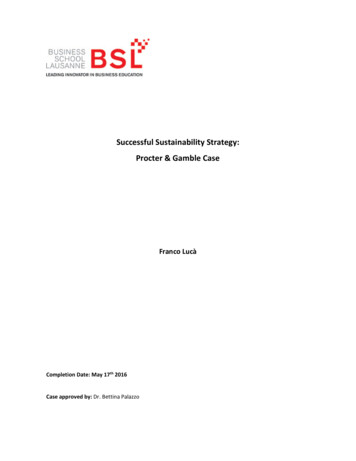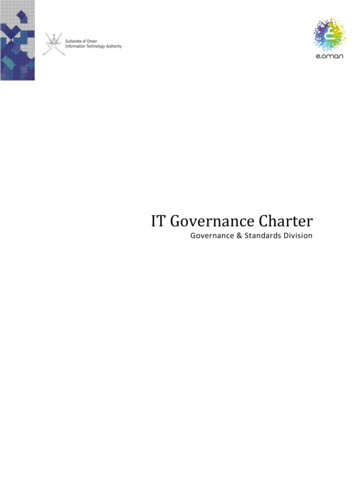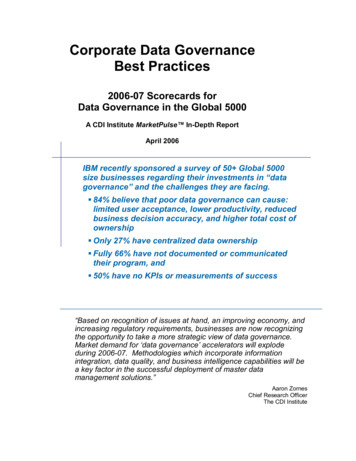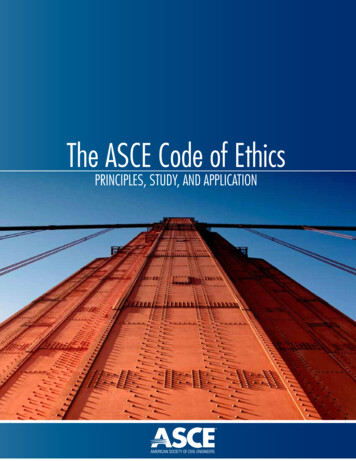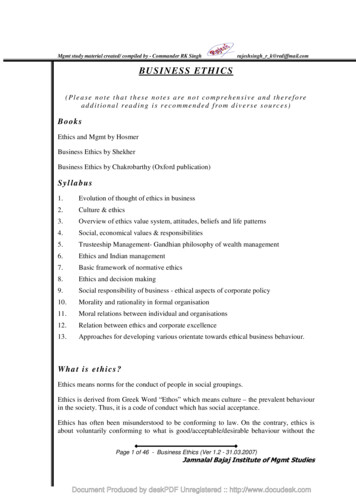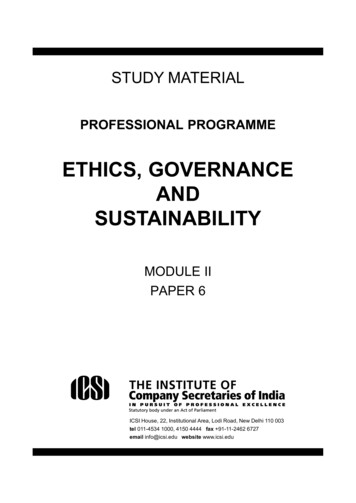
Transcription
STUDY MATERIALPROFESSIONAL PROGRAMMEETHICS, GOVERNANCEANDSUSTAINABILITYMODULE IIPAPER 6ICSI House, 22, Institutional Area, Lodi Road, New Delhi 110 003tel 011-4534 1000, 4150 4444 fax 91-11-2462 6727email info@icsi.edu website www.icsi.edui
THE INSTITUTE OF COMPANY SECRETARIES OF INDIATIMING OF HEADQUARTERSMonday to FridayOffice Timings – 9.00 A.M. to 5.30 P.M.Public Dealing TimingsWithout financial transactions – 9.30 A.M. to 5.00 P.M.With financial transactions – 9.30 A.M. to 4.00 P.M.Phones41504444, fo@icsi.eduLaser Typesetting by AArushi Graphics, Prashant Vihar, New Delhi, andPrinted at Tan Prints/PRN-2509/July 2014ii
PROFESSIONAL PROGRAMMEETHICS, GOVERNANCE AND SUSTAINABILITYCorporate Governance has emerged as an important academic discipline in its own right, bringing togethercontributions from accounting, finance, law and management. Corporate governance now offers a comprehensive,interdisciplinary approach to the management and control of companies. Corporate professionals of today andtomorrow must imbibe in themselves the evolving principles of good corporate governance across the globe ona continual basis. Excellence can be bettered only through continuous study, research and academic andprofessional interaction of the highest quality in the theory and practice of good corporate governance. Thecorporate world looks upon especially Company Secretaries to provide the impetus, guidance and direction forachieving world-class corporate governance.Company Secretaries are the primary source of advice on the conduct of business. This can take into its foldeverything from legal advice on conflicts of interest, through accounting advice, to the development of strategy/corporate compliance and advice on sustainability aspects.The paper on Ethics, Governance and Sustainability has been introduced to provide knowledge on globaldevelopment on governance, ethics and sustainability aspects and best governance practices followed worldwide.This paper would help in understanding of national and international governance norms, ethical business practices,corporate sustainability, CSR and sustainability reporting, role of various governance forums etc.The study material is based on those sections of the Companies Act, 2013 and the rules made there underwhich have been notified by the Government of India and came into force w.e.f. April 01, 2014 (includingAmendments/Clarifications/Circulars issued there under upto June, 2014). In respect of sections of the CompaniesAct, 2013 which have not been notified, applicable sections of Companies Act, 1956 have been dealt with in thestudy. Further students are advised to keep themselves abreast of latest developments on governance andsustainability issues by regularly reading economic dailies and visiting the websites of regulatory bodies, nationaland international corporate governance forums. Students are also advised to read regularly the ‘Student CompanySecretary’/’Chartered Secretary’ wherein all important regulatory amendments are reported regularly.In the event of any doubt, students may write to Directorate of Academics in the Institute for clarification atacademics@icsi.edu. Although due care has been taken in publishing this study material, yet the possibility oferrors, omissions and/or discrepancies cannot be ruled out. This publication is released with an understandingthat the Institute shall not be responsible for any errors, omissions and/or discrepancies or any action taken inthat behalf.Should there be any discrepancy, error or omission in the study material, the Institute shall be obliged if thesame is brought to its notice for issue of corrigendum in the e-bulletin Student Company Secretary.iii
SYLLABUSMODULE 2 – PAPER 6: ETHICS, GOVERNANCE AND SUSTAINABILITY (100 Marks)Level of Knowledge: Advance KnowledgeObjective: To acquire knowledge of ethics, emerging trends in good governance practices and sustainability.Contents:Part A: Ethics and Governance (70 Marks)1. Introduction Ethics, Business Ethics, Corporate Governance, Governance through Inner Consciousness andSustainability Failure of Governance and its Consequences2. Ethical Principles in Business Role of Board of Directors Organization Climate and Structure and Ethics Addressing Ethical Dilemmas Code of Ethics; Ethics Committee; Ethics Training; Integrity Pact Case Studies and Contemporary Developments3. Conceptual Framework of Corporate Governance Introduction, Need and Scope Evolution of Corporate Governance Developments in India Developments in Corporate Governance – A Global Perspective Elements of Good Corporate Governance4. Board Effectiveness - Issues and Challenges Board Composition; Diversity in Board Room; Types of Directors; Board’s Role and Responsibilities Chairman, CEO, Separation of Roles Relationship between Directors and Executives Visionary Leadership Board Charter, Meetings and Processes Directors’ Training and Development Performance Evaluation of Board and Directorsiv
5. Board Committees Introduction Various Board Committees, their Composition, Role and Responsibilities, Contribution to BoardGovernance Audit Committee Shareholders Grievance Committee Remuneration Committee Nomination Committee Corporate Governance Committee Corporate Compliance Committee Other Committees6. Legislative Framework of Corporate Governance in India Under Listing Agreement, SEBI Guidelines, Companies Act Corporate Governance in PSUs Banks Insurance Companies7. Legislative Framework of Corporate Governance – An International Perspective Australia Singapore South Africa United Kingdom Contemporary Developments in the Global Arena8. Risk Management and Internal Control Risk and its Classification Risk Management and Oversight Enterprise Risk Management Internal Control Roles and Responsibilities of Internal Control Disclosure about Risk, Risk Management and Internal Control9. Corporate Governance and Shareholder Rights Rights of Shareholders Challenges in Exercising Shareholders Rightsv
Corporate Governance issues with regard to Related Party Transactions Role of Investor Associations in Securing Shareholders Rights Role of Institutional Investors in Corporate Governance10. Corporate Governance and Other Stakeholders Employees Customers Lenders Vendors Government Society11. Corporate Governance Forums The Institute of Company Secretaries of India National Foundation for Corporate Governance Organisation for Economic Co-operation and Development Global Corporate Governance Forum Institute of Directors Commonwealth Association of Corporate Governance International Corporate Governance Network The European Corporate Governance Institute Conference Board The Asian Corporate Governance Association Corporate Secretaries International AssociationPart B: Sustainability (30 Marks)12. Sustainability Meaning and Scope Corporate Social Responsibility and Corporate Sustainability Sustainability Terminologies and Meanings Why is Sustainability an Imperative Sustainability Case Studies Triple Bottom Line (TBL)13. Corporate Sustainability Reporting Frameworks Global Reporting Initiative Guidelinesvi
National Voluntary Guidelines on Social, Environmental and Economic Responsibilities of Business International Standards Sustainability Indices Principles of Responsible Investment Challenges in Mainstreaming Sustainability Reporting Sustainability Reporting Case Studies14. Legal Framework, Conventions, Treaties on Environmental and Social Aspects15. Principle of Absolute Liability – Case Studies16. Contemporary Developments – Integrated Reportingvii
LIST OF RECOMMENDED BOOKSMODULE 2 : PAPER 6 : ETHICS, GOVERNANCE AND SUSTAINABILITYRecommended Readings and References:1.Inderjit Dube:Corporate Governance; LexisNexis Butterworths Wadhwa Nagpur2.Sanjiv Agarwal:Corporate Governance: Concept & Dimensions; Snow white PublicationsP. Ltd.3.K R Sampath:Law of Corporate Governance: Principles and Perspective; Snow whitePublications P. Ltd.4.N Balasubramanian5.H C Mruthyunjaya:Business Ethics and Value System, PHI6.A C Fernando:Business Ethics – An Indian Perspective7.ICSI Taxmann:Corporate Governance Beyond Letters8.JournalsCorporate Governance and Stewardship; Tata McGrawHill(a) ICSI — Chartered Secretary(b) ICSI — Student Company Secretary9.Guidance Note on Corporate Governance Certificate10.Companies Act, 201311.Rules on Companies Act, 201312.Listing Agreement by SEBIviii
ARRANGEMENT OF STUDY LESSONSPART A: ETHICS AND GOVERNANCE (70 MARKS)1.Introduction: Ethics and Governance2.Ethical Principles in Business3.Conceptual Framework of Corporate Governance4.Legislative Framework of Corporate Governance in India5.Board Effectiveness-Issues and Challenges6.Board Committees7.Corporate Governance and Shareholder Rights8.Corporate Governance and Other Stakeholders9.Risk Management and Internal Control10.Corporate Governance in Banks, Insurance and Public Sector Companies11.Corporate Governance Forums12.Legislative Framework of Corporate Governance – An International PerspectivePART B: SUSTAINABILITY (30 MARKS)1.Corporate Social Responsibility2.Sustainability3.Corporate Sustainability Reporting Framework4.Legal Framework, Conventions, Treaties on Environmental and Social Aspects5.Principles of Absolute LiabilityTEST PAPERSix
CONTENTSLESSON 1INTRODUCTION: ETHICS AND GOVERNANCEPageIntroduction2Governance through Inner Conscience2Ethics in Business3The Concept of Business Ethics3Corporate Governance Ethics4Theories of Ethics5Ethical Theories5Deontological Theories – Kantian Ethics5Teleological Theories6Utilitarian Approach6Virtue Theory6Justice Theory7Theory of Egoism7Theory of Relativism8Scope of Business Ethics8Advantages of Business Ethics10CONCLUSION11LESSON ROUND-UP11SELF-TEST QUESTIONS12LESSON 2ETHICAL PRINCIPLES IN BUSINESSIntroduction14Organization Structure and Ethics14Role of Board of Directors15Ethics Programme15Best Practices in Ethics Programme16x
PageFeatures of Good Ethics Programme16Code of Ethics17Code of Conduct18Preamble19General Moral Imperatives19Specific Professional Responsibilities20Specific Additional Provisions for Board Members and Management Committee Members22Compliance with the Code22Credo23Ethics Training and Communication25Ethics Committee26Integrity Pact27Concept of whistle-blower28Social and Ethical Accounting30Ethics Audit30Ethical Dilemma31CONCLUSION33LESSON ROUND-UP34SELF-TEST QUESTIONS35LESSON 3CONCEPTUAL FRAMEWORK OF CORPORATE GOVERNANCEIntroduction38Definitions of Corporate Governance38ICSI Principles of Corporate Governance39Need for Corporate Governance40Evidence of Corporate Governance from the Arthashastra41Corporate Governance Theories42Evolution of Corporate Governance44Corporate Governance Developments in USA44Corporate Governance Developments in UK44Developments in India48Confederation of Indian Industry (CII) - Desirable Corporate Governance: A Code48xi
PageGist of Coverage of CII Desirable Corporate Governance: A Code51Kumar Mangalam Birla Committee (2000)52Task Force on Corporate Excellence Through Governance55Naresh Chandra Committee (2002)56N.R. Narayana Murthy Committee (2003)61Dr. J J Irani Expert Committee on Company LAW (2005)64Corporate Governance Voluntary Guidelines 200965Some of the Provisions Relating to Corporate Governance under Companies Act, 201366Corporate Governance through Listing Agreement66Elements of Good Corporate Governance68LESSON ROUND UP70SELF TEST QUESTIONS71Lesson 4Legislative Framework of Corporate Governance In IndiaIntroduction74Board Structure74Separation of Roles of Chairman and Chief Executive76Meetings of the Board76Powers of the Board77Board Committees78Audit Committees78Nomination and Remuneration Committees78Stakeholders Relationship Committee78Corporate Social Responsibility Committee79Disclosure and Transparency791. In Terms of Companies Act, 2013792. In Terms of Various Rules Made Under Companies Act, 2013813. In Terms of Listing Agreement844. Disclosures In Terms of SEBI Regulations91CONCLUSION95ANNEXURE95LESSON ROUND-UP112SELF-TEST QUESTIONS112xii
PageLESSON 5BOARD EFFECTIVENESS - ISSUES AND CHALLENGESIntroduction114Segment I - Role of Directors114Who are Board of Directors?115Types of Board115Who are Directors?116Governance Functionaries116Case Studies125Board Composition132Segment II - Board Charter133Board Processes134Board Meetings134Good Practices in Convening Board Meetings134Provisions Regarding Meetings of the Board136Decision Making Process at the Meeting139Separate Meetings142Directors’ Time Commitment142Segment III - Responsibilities of Board143Corporate Social Responsibility144Responsibility towards government144Inter-se responsibilities145Responsibility for Leadership145Policy Governance145Relationship between Directors And Executive146The Key Difference between Directors And Managers146Barriers to Visionary Leadership148Segment IV - Training of Directors148Performance Review of Board & Individual Director150Parameters151Performance Evaluation of the Non-Executive Director152CONCLUSION153LESSON ROUND UP153SELF TEST QUESTIONS154xiii
PageLESSON 6BOARD COMMITTEESIntroduction158Need and Advantages of Committees Management158Enhancing Effectiveness of Committees159Membership in Committees159Mandatory Committees160Audit Committee160Nomination and Remuneration Committee167The Stakeholders Relationship Committee169Corporate Social Responsibility Committee169Non-Mandatory Committees170Corporate Governance Committee171Regulatory, Compliance & Government Affairs Committee171Science, Technology & Sustainability Committee172Risk Management Committee173Other Committees173LESSON ROUND UP174SELF TEST QUESTIONS175LESSON 7CORPORATE GOVERNANCE AND SHAREHOLDER RIGHTSIntroduction178Rights of Shareholders178Shareholder rights enshrined in the Companies Act, 2013180Challenges in Exercising Shareholders Rights186Investor Protection in India186Insider Trading187Investor Education & Protection Fund187Protection of Rights of Minority Shareholders and Related Party Transactions190Shareholder activism195Investor Relations (IR)197Role of Institutional Investors in Corporate Governance199xiv
PageInstitutional Investors – Global Trends201PRI- Principles for Responsible Investment- An investor initiative in partnership with UNEP Finance Initiativeand the UN Global Compact203The Code for Responsible Investing in South Africa (CRISA)205California Public Employees’ Retirement System205Tools Used by Institutional Investors206CONCLUSION208LESSON ROUND UP209SELF TEST QUESTIONS210LESSON 8CORPORATE GOVERNANCE AND OTHER STAKEHOLDERSIntroduction: Stakeholder Concept212Recognition of Stakeholder Concept In Law212Stakeholder Engagement213Stakeholder Analysis214Better Stakeholders Engagement Ensures Good Governance214Types of Stakeholders215The Caux Round Table215The Clarkson Principle of Stakeholder Management219Governance Paradigm and Stakeholders219Whistle Blower Policy220Recent Developments221The Employees-First t224Corporate Governance Voluntary Guidelines 2009224National Voluntary Guidelines on Social, Environmental & Economic Responsibilities of Business225SEBI - Business Responsibility Report225Society225Governance Norms for Stakeholders under Companies Act, 2013226CONCLUSION226xv
PageLESSON ROUND UP227SELF-TEST QUESTIONS228Lesson 9Risk Management and Internal ControlIntroduction230Segment I - Risk Management230Risk Classification230Risk Management Process232Advantages of Risk Management236Fraud Risk Management237Reputation Risk Management238Non-Compliance Risk Management239Secretarial Audit & Company Secretary in Practice (PCS)240Responsibility of Risk Management241Role of Company Secretary242Segment II- Internal Control System243Internal Control Defined244COSO Definition of Internal Control245Components of Internal Control246Relationship of Objectives and Components247Components and Principles247Role and Responsibilities With Regard to Internal Control248CONCLUSION252LESSON ROUND UP253SELF TEST QUESTIONS254LESSON 10CORPORATE GOVERNANCE IN BANKS, INSURANCE AND PUBLIC SECTOR COMPANIESIntroduction256Classification of Banks256Regulation of Banks256Board Composition257Nationalised Banks (Management and Miscellaneous Provisions) Scheme, 1970258xvi
PageGovernance in Insurance Companies259Corporate Governance in Public Sector Enterprises263CONCLUSION265LESSON ROUND-UP265SELF-TEST QUESTIONS266LESSON 11CORPORATE GOVERNANCE FORUMSIntroduction268A. Institute of Company secretaries of India268B. National Foundation for Corporate Governance (NFCG)270C. Organization for Economic Co-Operation and Development (OECD)271D. Global Corporate Governance Forum (GCGF)272E. The Institute of Directors (IoD), UK274F. Commonwealth Association of Corporate Governance (CACG)274G. International Corporate Governance Network (ICGN)275H. The European Corporate Governance Institute (ECGI)276I. Conference Board276J. The Asian Corporate Governance Association (ACGA)277K. Corporate Secretaries International Association (CSIA)277LESSON ROUND UP279SELF TEST QUESTIONS279LESSON 12LEGISLATIVE FRAMEWORK OF CORPORATE GOVERNANCE - AN INTERNATIONALIntroduction282Australia282The ASX Corporate Governance Council issued Corporate Governance Principles and Recommendations 283Singapore287Corporate Governance in Singapore287South Africa291Corporate Governance in South Africa291United Kingdom295xvii
PageCorporate Governance in the United Kingdom (UK)295Malasiya298Malaysian Corporate Governance Code, 2012298Contemporary Developments in Corporate Governance – Globally300European Commission and legislative framework300Corporate Governance framework in European Union300European Commission Action Plan – 2012301Corporate Governance Codes - Globally302LESSON ROUND-UP302SELF-TEST QUESTIONS303LESSON 13CORPORATE SOCIAL RESPONSIBILITYIntroduction306Meaning and Definitions306CSR is not Philanthropy308CSR is a contract with society308Why CSR at All?308Factors Influencing CSR309Triple Bottom Line Approach of CSR310CSR in INDIA311Corporate Social Responsibility Voluntary Guidelines, 2009311National Voluntary Guidelines on Social, Environmental and Economic Responsibilities of Business,2011314Corporate Social Responsibility Under The Companies Act, 2013318Companies (Corporate Social Responsibility Policy) Rules, 2014320Corporate Citizenship - Beyond The Mandate of Law323CSR Standard - ISO 26000324CSR Assessment325CONCLUSION325LESSON ROUND-UP327SELF-TEST QUESTIONS327xviii
PageLESSON 14SUSTAINABILITYIntroduction330Sustainable Development330Role of Business in Sustainable Development331Sustainability Terminologies332What Is Corporate Sustainability?334Corporate Sustainability and Corporate Social Responsibility336Why is Sustainability an Imperative?337Government’s Role in improving Sustainability Reporting337Kyosei337Triple Bottom Line (TBL)339CONCLUSION340LESSON ROUND-UP341SELF-TEST QUESTIONS341LESSON 15CORPORATE SUSTAINABILITY REPORTING FRAMEWORKSIntroduction344Key drivers of sustainability reporting344Business Responsibility Reporting in India345Global Reporting Initiative (GRI)348Transition to G4 Guidelines353UN Global Compact354CSR Reporting Frameworks356UN-Principles for Responsible Investment (PRI)357Sustainability Indices359Benefits Of Sustainability Reporting361Challenges In Mainstreaming Sustainability Reporting361Contemporary Developments- Integrated Reporting362Development of Successful Sustainability Report362Sustainability Reporting – Case Studies363CONCLUSION366xix
PageBusiness Responsibility Reports - Frequently Asked Questions (FAQs)366LESSON ROUND-UP371SELF-TEST QUESTIONS371Lesson 16LEGAL FRAMEWORK, CONVENTIONS, TREATIES ON ENVIRONMENTAL AND SOCIAL ASPECTSIntroduction3741. United Nations Conference on Human Environment3742. United Nations Environment Programme3743. Brundtland Commission3754. United Nations Conference on Environment and Development3755. Kyoto Protocol3806. Bali Roadmap3817. United Nations Conference on Sustainable Development, Rio 203818. International Forest Carbon Initiative3839. International Labour Organisation (ILO)384Regulatory Framework of Environment Protection in India384A Scheme on Labeling of Environment Friendly Products386LESSON ROUND-UP388SELF-TEST QUESTIONS389LESSON 17PRINCIPLES OF ABSOLUTE LIABILITYIntroduction392Rule in Rylands v. Fletcher392Applicability of Rylands Doctrine in India393Water Pollution396Corporate Manslaughter and Corporate Homicide Act 2007, United Kingdom398CONCLUSION398LESSON ROUND-UP399SELF-TEST QUESTIONS399TEST PAPERSTest Paper 1402Test Paper 2404xx
Lesson 1Lesson 1Introduction: Ethics and GovernanceIntroduction: Ethics and GovernanceLESSON OUTLINELEARNING OBJECTIVES– IntroductionThe objective of this study lesson is to enablethe students to understand the importance ofBusiness Ethics and its advantages to theorganization. Promotion of culture of ethics isan imperative, and it is increasingly beingrealized that it is the bedrock of goodgovernance which ultimately re-instills theconfidence of the stakeholder in the company.The objective of the study lesson is to enablethe students understand the following:– Governance through Inner conscience– Ethics– Ethics in Business– Corporate Governance Ethics– Theories of Ethics– Scope of Business Ethics– Inner Conscience and its Linkage toGovernance– Advantages of Business Ethics– The concept of business ethics– The ethics philosophy– Conclusion– Scope of Business Ethics in– Lesson Round Up– Compliance– Self Test Questions– Finance– Human Resources– Marketing– Production– Advantages of Ethics“Ethics is knowing the difference between what you have a right to do and what is right to do.”- Potter Stewart11
2 PP-EGASINTRODUCTIONToday, the corporate world as a whole is in the process of acquiring a moral conscience. The new and emergingconcepts in management like corporate governance, business ethics and corporate sustainability are some ofthe expressions through which this emerging ethical instinct in the corporate world is trying to express andembody itself in the corporate life. In this study we examine the concept of ethics and its importance for thebusiness, corporate governance and governance through inner conscience and sustainability.GOVERNANCE THROUGH INNER CONSCIENCETo be able to do the right thing in the right way, in each case and at every moment, one must be in the rightconsciousness.– Sri AurobindoInner consciousness is the awareness, the capacity to listen to the inner voice that tells us that there is someonewho is looking up at us and also warns that there is someone who is watching us. The soul and core of CorporateGovernance is not the conduct or behavior that we see outwardly. It is internalized values that an organizationand its top management follow.The essence of a human being is consciousness and the world we create around us is the expression of ourconsciousness. The creative and the beautiful as well as the corrupt and degenerate are the outcome of ourconsciousness. The great thoughts and deeds of Mahatma Gandhi or Mother Teresa are the result of theirconsciousness. Similarly, the scams of WorldCom and Satyam are also the result of corresponding consciousness.The quality of our consciousness is not determined by the Intelligence Quotient or our intellect.The quality our consciousness depends on the part of the consciousness in which we live. There are two partsin our consciousness. First is the lower physical-vital being driven predominantly by self-interest, material needsand sensuous desires, quite often degenerating into greed. The second is the higher mental, moral and spiritualbeing seeking for truth, beauty, goodness, harmony and unity. The corporate governance, to be truly effectiveand enduring, has to be based on this higher part of our human nature or conscience.An important quality of this higher part of our conscience is self-governance. This higher self in us doesn’tneed the threat of external Law or the lure of an external reward to remain good or ethical; it has an intrinsicmotivation for ethics and self-regulation. This ideal of self-governance must be highest goal of all governance.Self-governing Individual in a self-governing community must be the highest ideal of corporate governance.We are, individually and collectively, still far away from this ideal. We still need laws because we are not yetready for self-governance. But we must keep this ideal as a pole-star and gradually progress or evolve towardsit through a combination of enlightened regulation of the external environment and inner transformation througheducation and inner discipline.Ideally, corporate governance should endeavour to create corporate consciousness and an environment inwhich those who are charged with governance and those who are governed display genuine ethical, social andecological responsibilities.ETHICSThe term “ethics” is derived from the Greek word “ethos” which refers to character, guiding beliefs, standardsand ideals that pervade a group, a community or people. The Oxford Dictionary states ethics as “the moralprinciple that governs a person’s behaviour or how an activity is conducted”. The synonyms of ethics as perCollins Thesaurus are – conscience, moral code, morality, moral philosophy, moral values, principles, rules ofconduct and standards.
Lesson 1Introduction: Ethics and Governance3Ethics refers to well-founded standards of right and wrong that prescribe what humans ought to do, usually interms of rights, obligations, benefits to society, fairness, or specific virtues.Thus, ethics relates to the standards of conduct and moral judgments that differentiate right from wrong. Ethicsis not a natural science but a creation of the human mind. For this reason, it is not absolute and is open to theinfluence of time, place and situation.In bygone times, kings used to keep food testers who used to eat the food prepared for the king before it wasoffered to him. This was royal clinical research to find out if the food was poisoned. This practice was notquestioned because the king was regarded as the most important person in the kingdom, and his life was moreprecious than that of anyone else. It was the ethics of the time.What is considered ethical behaviour in one society might be considered unethical in another. For example,euthanasia (mercy killing) is permitted in some countries but it is considered strictly unethical is most countries.Ethics has following features:– Ethics is a conception of right or wrong conduct. Ethics tells us when our behaviour is moral and whenit is immoral. It deals with the fundamental human relationship, how we think and behave towardsothers and how we want them to think and behave towards us.– Ethics relates to the formalised principles derived from social values. It deals with the moral choices thatwe make in the course of performing our duties with regard to the other members of society. Hence, it isrelevant in the context of a society only.– Ethical principles are universal in nature. They prescribe obligations and virtues for everybody in asociety. They are important not only in business and politics but in every human endeavour.– There exist no sharp boundaries between ethical and non-ethical. Therefore, people often face ethicaldilemmas wherein a clear cut choice becomes very difficult.– The concepts of equity and justice are implicit in ethics. Fair and equitable treatment to all is its primaryaim.– Ethics and legality of action do not necessarily coincide. What a society interprets as ethical or unethicalends up expressed in laws. The legality of actions and decisions does not necessarily make themethical. For example, not helping an injured person in a road accident may be unethical but not illegal.ETHICS IN BUSINESSThe Concept of Business EthicsBusiness ethics is one of the important branches of applied ethics. Business ethics is the application of generalethical ideas to business. ” Business ethics refers to the moral principles and standards and a code of conductthat businessmen are expected to follow while dealing with others. Business essentially is a means of society touse scarce resources to produce in an efficient manner those goods and services which society wants and iswilling to pay for. Businesses must balance their desire to maximise profits against the needs of stakeholders.The significant issues in business ethics include ethical management of enterprise in relation to its stakeholdersin particular and natural environment in general.Ethics is necessary and important in business due to several reasons, some of which are given below– There is a kind of social contract between the society and business by which the society expects thebusiness to work in its interest. Society creates and accepts business enterprises; hence it expectsthem to work in a manner which is not detrimental to its well being and interests. Technologicaladvancements have to be made but their impact on the environment and mankind has he kept in mind.
4 PP-EGAS– Ethical conduct is in the long-term interests of businessmen. A business enterprise that is honest andfair to its customers, employees, and other stakeholders earns their trust and good will. It ultimatelyresults in customer satisfaction, healthy competition, industrial growth and high earnings. Businessesmust balance their desire to maximise profits against the requirements of stakeholders. Maintaining thisbalance often requires tradeoffs. To address this unique aspect of business, rules are articulated toguide it to earn profits without harming individuals or society as a whole. While referring to businessactivity profile, Mahatma Gandhi once mentioned that all business entrepreneurs should ask themselvesthe question whether the activities they are contemplating would b
Objective: To acquire knowledge of ethics, emerging trends in good governance practices and sustainability. Contents: Part A: Ethics and Governance (70 Marks) 1. Introduction Ethics, Business Ethics, Corporate Governance, Governance through Inner Consciousness and Susta



